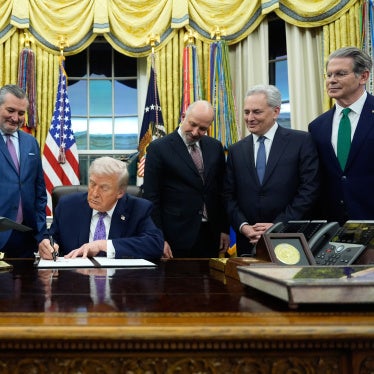What is Section 702?
Section 702 of the FISA Amendments Act of 2008 (50 U.S.C. § 1881a) grew out of a secret George W. Bush-era warrantless surveillance program that monitored the international communications of people in the US. It currently underpins some of the most sweeping warrantless NSA surveillance programs that affect Americans and people across the globe.
Warrantless Surveillance, Designed to Monitor Americans and Others
While Section 702 states that the NSA’s surveillance under the law must “target” foreigners abroad, in reality the law allows the agency to capture potentially vast numbers of Americans’ communications with people overseas (as well as Americans’ domestic Internet communications that just happen to be routed through another country en route to the recipient).
This surveillance is warrantless, and no judge ever reviews or approves the government’s individual targeting decisions. The law does not require the government to show it has any suspicion that anyone who may be caught up in this dragnet has engaged in wrongdoing.
PRISM and Upstream
The executive branch uses Section 702 to seize private communications through two extremely large programs. The PRISM program enables the NSA (via the FBI) to gather and store enormous amounts of users’ communications that are held by Internet companies. Meanwhile, Upstream surveillance appears to involve automatic government searches of virtually all of the communications that flow over crucial pieces of Internet infrastructure that connect the US to the rest of the world.
Backdoor Searches: An End Run Around the Fourth Amendment
The FBI currently has the power to search (or “query”) Section 702 data without a warrant. The Bureau describes these warrantless backdoor searches as “routine and encouraged.” Such queries effectively evade other provisions of US law that require an individualized warrant or court order for access to such data.
It’s Not Just About Terrorism
Section 702 surveillance and FBI backdoor searches of the data are not limited to terrorism-related matters—far from it. In fact, Section 702 allows the government to seize the data as long as “a significant purpose” of the surveillance is to acquire “foreign intelligence information,” an expansively defined term. The FBI then has the power to search this data for a broad set of purposes, including to determine whether the data may be evidence of any offense.
A Lack of Checks and Balances
There are few checks on the executive branch’s power in this area. For example, although FISA requires the government to notify criminal defendants if it intends to use any Section 702-derived evidence in proceedings against them, it has provided such notification in only a handful of cases to date. This raises concerns that the government may be preventing other defendants from learning that they were warrantlessly surveilled—thus helping to shield Section 702 from constitutional challenges.
The Section 702 Sunset
Section 702 is scheduled to expire on December 31, 2017. Congress must thoroughly reform the law if any re-authorized version is to comply with the Constitution and human rights.
What Congress Should Do
To make progress toward restoring the rights of Americans and others, any bill to reform Section 702 should include, among other things:
- An end to indiscriminate “upstream” scanning.
- A prohibition on warrantless backdoor searches of Section 702 data.
- A narrowing of the purposes for which the government may conduct Section 702 surveillance, such that the law only allows monitoring where strictly necessary to prevent serious, specified, clearly defined offenses.
- A stronger requirement for the government to provide notice to criminal defendants where it has employed Section 702 surveillance as part of the investigation that led to proceedings against them.
- Other provisions that would facilitate legal challenges to potential abuses under the law, including by removing barriers that have prevented activists and others from showing that they are entitled to bring cases.
- Firmer restrictions on the sharing of Section 702 data among federal agencies and with state, local, and tribal bodies to ensure proper oversight and prevent abuses.
- The prevention of the government’s use of Section 702 to monitor communications that are protected by legal privilege, such as those between attorneys and their clients, journalists and their sources, and doctors and their patients.
- Requirements for greater transparency about the government’s activities under Section 702, and the removal of restrictions on companies’ sharing of information with the public about orders they have received.
- Another sunset deadline to provide momentum for a further round of reforms.







